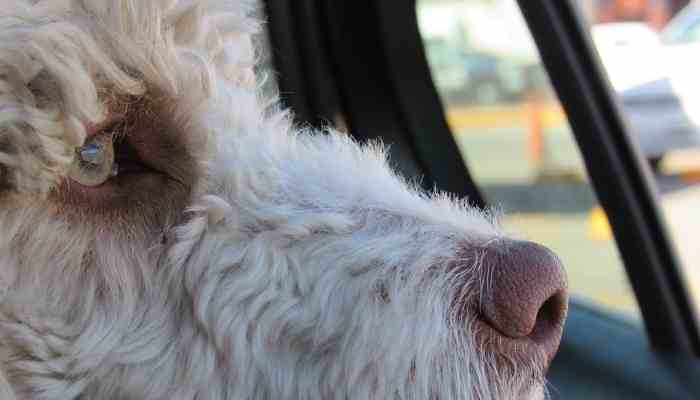Understanding canine car anxiety is an important step in helping your dog feel more comfortable and relaxed during car travel. Canine car anxiety can manifest in a variety of ways, including pacing, panting, whining, trembling, or vomiting. It can be caused by a number of factors, including previous negative experiences, motion sickness, or fear of the unfamiliar.
One common cause of canine car anxiety is motion sickness. This can be exacerbated by car movements and can lead to nausea, vomiting, and overall discomfort for the dog. In some cases, dogs may also experience motion sickness due to anxiety or stress related to car travel.
Another cause of canine car anxiety is fear of the unfamiliar. Dogs that are not used to car travel may be overwhelmed by the sights, sounds, and sensations of being in a car. This can lead to a range of anxiety-related behaviours, including barking, whining, or attempting to escape from the car.
In some cases, canine car anxiety may be related to past negative experiences. Dogs that have been involved in car accidents, or have had traumatic experiences related to car travel, may be more likely to experience anxiety or fear during car rides.
It is important for dog owners to be aware of the signs of canine car anxiety and to take steps to manage and alleviate their dog’s anxiety. This may involve providing plenty of positive reinforcement during car rides, such as treats or toys, to help your dog associate the car with positive experiences. It may also involve using calming aids, such as pheromone sprays or calming music, to help reduce anxiety during car travel.
In some cases, behaviour modification techniques may be necessary to help your dog overcome car anxiety. This may involve gradually exposing your dog to car travel, starting with short, low-stress rides and gradually increasing the length and intensity of the rides over time. It may also involve working with a professional dog trainer or behaviourist to develop a personalised plan for managing your dog’s anxiety.
FAQ
What are the common signs of dog car anxiety? – The common signs of dog car anxiety may include panting, drooling, pacing, whining, barking, trembling, restlessness, vomiting, or attempting to escape from the car. In some cases, dogs may even become aggressive towards people or other animals in the car.
What causes dog car anxiety? – Dog car anxiety can be caused by a variety of factors, including negative experiences during car travel, lack of exposure to car travel during the critical socialization period, motion sickness, and general anxiety or fear towards new environments or experiences. Additionally, previous negative experiences with car travel, such as getting into a car accident or being left in a hot car, can also contribute to the development of car anxiety in dogs.
Can puppies develop car anxiety? – Yes, puppies can develop car anxiety. Like other fears and anxieties, car anxiety can develop in response to negative experiences or lack of exposure to car travel during the critical socialization period in a puppy’s life. Gradually acclimating your puppy to car travel and using positive reinforcement techniques can help prevent or minimize car anxiety in puppies.
Can dog car anxiety be prevented? – Dog car anxiety may not always be preventable, but there are several things you can do to help prevent it or minimize its severity. These include gradually acclimating your dog to the car, using a comfortable and secure carrier or harness, providing frequent breaks, and using calming products such as pheromone sprays or essential oils. Additionally, rewarding your dog for calm behaviour during car rides can also help prevent or reduce car anxiety.
Are there any medications that can help alleviate dog car anxiety? – Yes, there are medications that can help alleviate dog car anxiety. Anti-anxiety medications, such as benzodiazepines or selective serotonin reuptake inhibitors (SSRIs), can be prescribed by a veterinarian to help calm an anxious dog during car travel.
Can car anxiety be a sign of a larger behavioural problem? – Yes, car anxiety can be a sign of a larger behavioural problem in dogs. It may indicate a general fear or anxiety towards new environments, separation anxiety, or other underlying behavioural issues.
How can I make car rides more comfortable for my dog? – There are several ways to make car rides more comfortable for your dog, including gradually acclimating them to the car, providing a comfortable and secure space for them in the car, using calming products such as pheromone sprays or essential oils, and rewarding them for calm behaviour during car rides. Additionally, taking frequent breaks, offering water and treats, and playing calming music can also help your dog feel more comfortable and relaxed during car travel.
Is it safe to travel with a dog who has car anxiety? – It depends on the severity of the dog’s car anxiety. If the anxiety is mild and the dog can be safely secured in the car, it may be safe to travel with the dog. However, if the anxiety is severe and the dog becomes agitated or distressed during car travel, it may not be safe for the dog or the passengers in the car.
In conclusion, understanding canine car anxiety is an important step in helping your dog feel more comfortable and relaxed during car travel. Canine car anxiety can be caused by a variety of factors, including motion sickness, fear of the unfamiliar, and past negative experiences. It is important for dog owners to be aware of the signs of canine car anxiety and to take steps to manage and alleviate their dog’s anxiety, whether through positive reinforcement, calming aids, or behaviour modification techniques. With patience and persistence, it is possible to help your dog overcome car anxiety and enjoy car travel once again.



